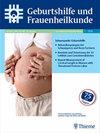Intrathecal Therapy Options for Meningeal Carcinomatosis
IF 2.4
4区 医学
Q2 OBSTETRICS & GYNECOLOGY
引用次数: 0
Abstract
Abstract Around 5 percent of all patients with metastatic breast cancer go on to develop distant metastases in the meninges, also known as meningeal carcinomatosis. The median survival of these patients is between 3.5 and 4.5 months. Current treatment approaches are based on radiotherapy, systemic and intrathecal therapy. Methotrexate, liposomal cytarabine and trastuzumab are the most common substances used for intrathecal therapy. The aim of this review was to provide an overview of these intrathecal therapy options for meningeal carcinomatosis. A systematic search of the literature was carried out in PubMed using the following search terms: “meningeal metastases”, “meningeal carcinomatosis”, “leptomeningeal metastasis”, “leptomeningeal carcinomatosis”, “leptomeningeal disease”, “breast cancer”, “MTX”, “methotrexate”, “DepoCyte”, “liposomal cytarabine”, “trastuzumab” and “anti-HER2”. This search resulted in 75 potentially relevant studies, 11 of which were included in this review after meeting the previously determined inclusion and exclusion criteria. The studies differ considerably with regards to study design, cohort size, and dosages of administered drugs. In principle, intrathecal therapy has a tolerable side-effects profile and offers promising results in terms of the median overall survival following treatment with trastuzumab for HER2-positive primary tumors. The focus when treating meningeal carcinomatosis must be on providing a multimodal individual therapeutic approach. However, comprehensive studies which compare the efficacy and side effects of individual pharmaceuticals are lacking. Because of the poor prognosis associated with meningeal carcinomatosis, an approach which treats only the symptoms (best supportive care) should always be considered and discussed with affected patients.脑膜癌的鞘内治疗选择
大约5%的转移性乳腺癌患者继续发展为脑膜远处转移,也称为脑膜癌病。这些患者的中位生存期在3.5至4.5个月之间。目前的治疗方法是基于放疗,全身和鞘内治疗。甲氨蝶呤、脂质体阿糖胞苷和曲妥珠单抗是鞘内治疗中最常用的物质。本综述的目的是提供这些鞘内治疗方案的概述脑膜癌病。在PubMed中系统检索相关文献,检索词为:“脑膜转移”、“脑膜癌病”、“脑膜转移”、“脑膜癌病”、“脑膜病”、“乳腺癌”、“MTX”、“甲氨蝶呤”、“DepoCyte”、“脂质体阿糖胞苷”、“曲妥珠单抗”和“抗her2”。检索结果为75项可能相关的研究,其中11项在符合先前确定的纳入和排除标准后纳入本综述。这些研究在研究设计、队列大小和给药剂量方面存在很大差异。原则上,鞘内治疗具有可耐受的副作用,并且在曲妥珠单抗治疗her2阳性原发性肿瘤后的中位总生存期方面提供了有希望的结果。治疗脑膜癌病的重点必须是提供多模式的个体治疗方法。然而,目前还缺乏比较不同药物疗效和副作用的综合研究。由于与脑膜癌病相关的预后不良,应始终考虑只治疗症状的方法(最佳支持性护理),并与受影响的患者讨论。
本文章由计算机程序翻译,如有差异,请以英文原文为准。
求助全文
约1分钟内获得全文
求助全文
来源期刊

Geburtshilfe Und Frauenheilkunde
医学-妇产科学
CiteScore
2.50
自引率
22.20%
发文量
828
审稿时长
6-12 weeks
期刊介绍:
Geburtshilfe und Frauenheilkunde (GebFra) addresses the whole field of obstetrics and gynecology and is concerned with research as much as with clinical practice. In its scientific section, it publishes original articles, reviews and case reports in all fields of the discipline, namely
gynecological oncology, including oncology of the breast
obstetrics and perinatal medicine,
reproductive medicine,
and urogynecology.
GebFra invites the submission of original articles and review articles.
In addition, the journal publishes guidelines, statements and recommendations in cooperation with the DGGG, SGGG, OEGGG and the Arbeitsgemeinschaft der Wissenschaftlichen Medizinischen Fachgesellschaften (AWMF, Association of Scientific Medical Societies, www.awmf.org). Apart from the scientific section, Geburtshilfe und Frauenheilkunde has a news and views section that also includes discussions, book reviews and professional information.
Letters to the editors are welcome. If a letter discusses an article that has been published in our journal, the corresponding author of the article will be informed and invited to comment on the letter. The comment will be published along with the letter.
 求助内容:
求助内容: 应助结果提醒方式:
应助结果提醒方式:


